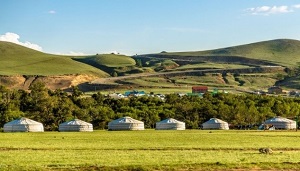
Kazakhstan is the ninth largest country in the world. Forest cover in the country is 4.7% (29 million hectares), an area the size of Great Britain. Almost 90% of the land in Kazakhstan is made up of steppe, desert and semi-desert. Forests in Kazakhstan are quite diverse: 66% are forested lands, of which 22% are cutover patches, glades and open stands, and 34 % are grasslands and other woodlands. Most of the forest area is owned by the state. The state supports private afforestation by reimbursement of expenses for the laying and cultivation of plantations of fast-growing tree and shrub species for industrial and energy purposes as well as for the creation and development of private forest nurseries. The country does not have timber reserves available for harvesting, but the forest sector has great potential for increasing revenue from non-wood products and tourism.
The main issues for the forest sector in Kazakhstan are inadequate equipment and a poorly developed infrastructure, insufficient scientific support, as well as insufficient legal and social protection of forestry workers. The Forestry and Wildlife Committee of the Ministry of Agriculture plans to increase the area of forests and productivity of the forest sector, develop the hunting industry and the system of wood processing and support the private sector. Priorities for national forest policy are the development of sound legal and administrative regulations, the improvement of the forest management system, the development of timber and non-wood forest products markets and the development of a long-term program for timber production. To be able to overcome challenges and support the best policy implementation, Kazakhstan needs to create a sound national set of criteria and indicators for sustainable forest management. It will be a useful tool for the country to monitor the implementation of national targets while integrating social, economic and ecological aspects of forestry.
Kazakhstan is working on the development of such a set of criteria and indicators for sustainable forest management. The UNECE/Food and Agriculture Organization of the UN (FAO) Forestry and Timber Section supports Kazakhstan in this process, through the project “Accountability Systems for Sustainable Forest Management in the Caucasus and Central Asia”, funded through the UN Development Account (UNDA). Having a national set of criteria and indicators for sustainable forest management will allow Kazakhstan to develop a monitoring system and to strengthen the national forest programme.
The national workshop “Criteria and Indicators for Sustainable Forest Management for Kazakhstan” was held 28-30 June 2017 in Astana, Kazakhstan. About 30 experts from the forest sector worked on an initial set of criteria and indicators for sustainable forest management. Innovative methods of work, which would be very useful in daily tasks, were introduced to national experts. International experts from UNECE/FAO, Turkey and Russia shared their experience and assisted governmental representatives in identifying and clarifying criteria and indicators which would suit Kazakhstan. Participatory methods were widely used during the workshop which provided opportunities to communicate and share ideas. Participants worked in different groups and at the end of the workshop presented a draft set of criteria and indicators for sustainable forest management for Kazakhstan.
“This project initiated the national process to develop criteria and indicators for sustainable forest management, encouraging the participation of all relevant stakeholders. Kazakhstan is committed to implement the project’s results at the national level by 2019”, said Mr. Maksat Elemesov, the Head of the Forestry and Protected Areas Unit at the Forestry and Wildlife Committee.
It is expected that in the future a set of criteria and indicators will be included in Kazakh legislation. A single coordinating body will be set up to strengthen the involvement of regions and businesses in the forest sector.
Further information:
Criteria and indicators are an increasingly common policy tool to support and measure progress towards sustainable forest management. “Criteria” forms the standard to monitor sustainable forest management with “indicators” being the component of the forest ecosystem or management system used to surmise the sustainability of forest management. This concept was developed after the adoption of the Forest Principles and Agenda 21 at the 1992 Earth Summit. Different international and regional processes (e.g. the FAO Forest Resource Assessment, Forest Europe, the Montreal process and others) use it as a framework for sustainable forest management. Although 25 years have passed since the concept was launched, many countries, among them Kazakhstan, were not yet able to develop a national criteria and indicator set.
More information about the project can be found here: http://www.unece.org/forests/areas-of-work/capacity-building/unda2016-2019.html
The press release published on the official website of the Forestry and Wildlife Committee of the Ministry of Agriculture of Republic of Kazakhstan: http://www.fhc.kz/news/6182/

